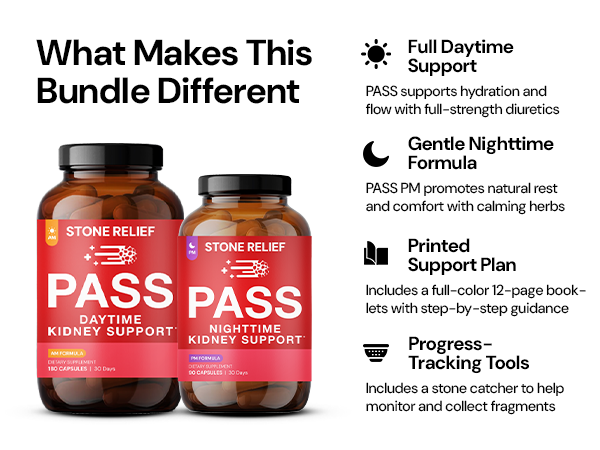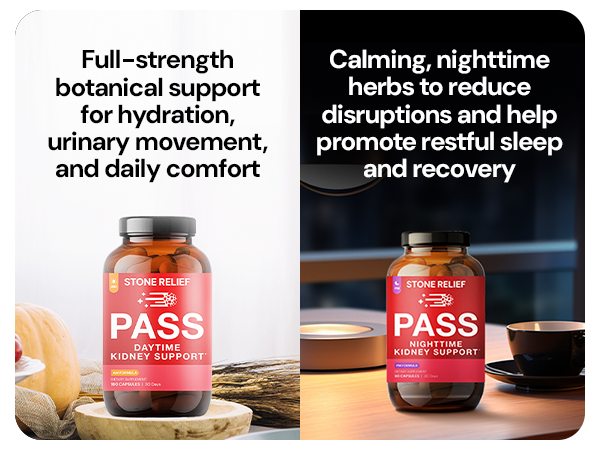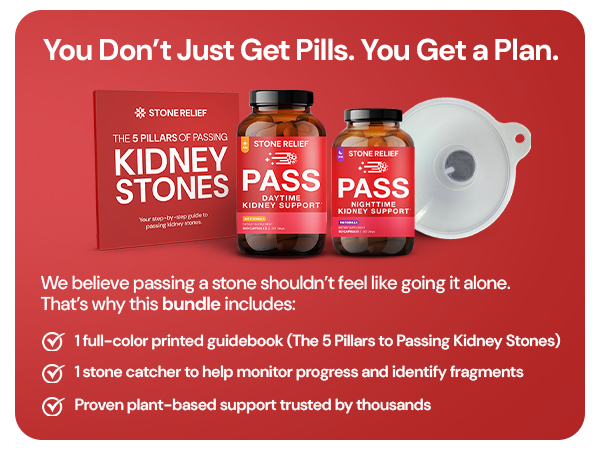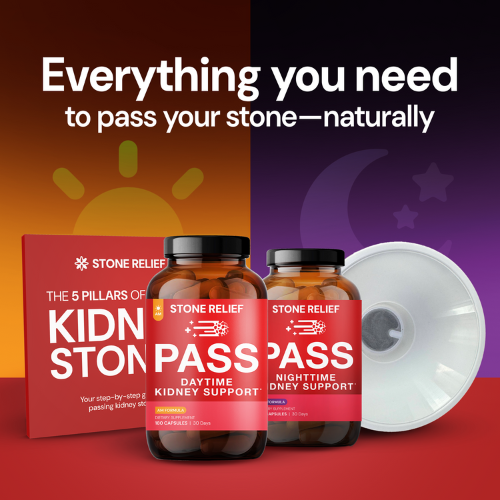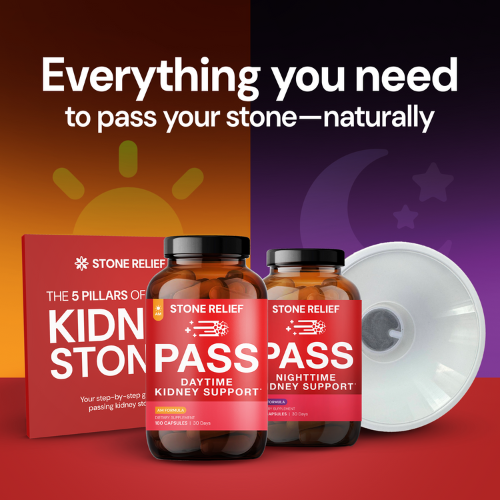Phosphate Leak and Kidney Stones: What You Need to Know
A phosphate leak in the body can trigger the formation of calcium phosphate kidney stones, which occur when the balance between calcium and phosphate is disrupted. This leak happens when too much phosphate is excreted, causing an imbalance that leads to stone formation in the kidneys. In this blog, we will discuss the causes of a phosphate leak, its consequences for kidney health, and how you can address this issue to prevent calcium phosphate stones. By making dietary adjustments and maintaining the proper nutrient balance, you can protect yourself from the pain and health risks associated with these stones.
Key Takeaways:
-
A phosphate leak occurs when more than 25% of phosphate is excreted in the urine, leading to an imbalance between calcium and phosphate.
-
This imbalance can result in calcium phosphate kidney stones.
-
Proper calcium and phosphate intake, particularly from animal-based sources, is essential for preventing kidney stones.
-
Fixing dietary deficiencies and correcting imbalances can help prevent future kidney stone formation.
The human body relies on a delicate balance between calcium and phosphate (phosphorus) to maintain good health. Several hormones and complex mechanisms work tirelessly to keep these minerals in harmony. However, when this balance is disrupted—specifically through a phosphate leak—the result can be the formation of calcium phosphate kidney stones.
But what exactly is a phosphate leak, and how does it contribute to kidney stones? In this blog, we will explore the process behind a phosphate leak, its connection to calcium phosphate stones, and the ways you can correct this imbalance to prevent stone formation.
🛒 Check Price & Purchase Stone Relief Pass AM/PM Bundle on Amazon
What Is a Phosphate Leak?
To understand what happens during a phosphate leak, we need to look at how the kidneys function. On a daily basis, the kidneys filter between 140 to 200 liters of blood, a massive amount of circulation that keeps the body’s waste systems in check. The kidneys are responsible for removing waste from the body, but phosphate, which is not considered a waste product, is also filtered through the kidneys.
The body typically filters 32 milligrams of phosphate per liter of blood every day. Phosphate is reabsorbed at a rate of 80-85%, while the remaining 15-20%—roughly 600 to 900 milligrams—is excreted through waste products like urine and bowel movements. This system works in a net-zero way, where the phosphate intake from food is balanced by the amount excreted.
A phosphate leak occurs when 25% or more of phosphate is excreted through the urine or bowel movements, which is far more than the body normally excretes. This can lead to the excretion of over 1000 milligrams of phosphate daily, a situation referred to as hyperphosphatemia. This excess phosphate in the body can lead to a number of issues, most notably calcium phosphate kidney stones.
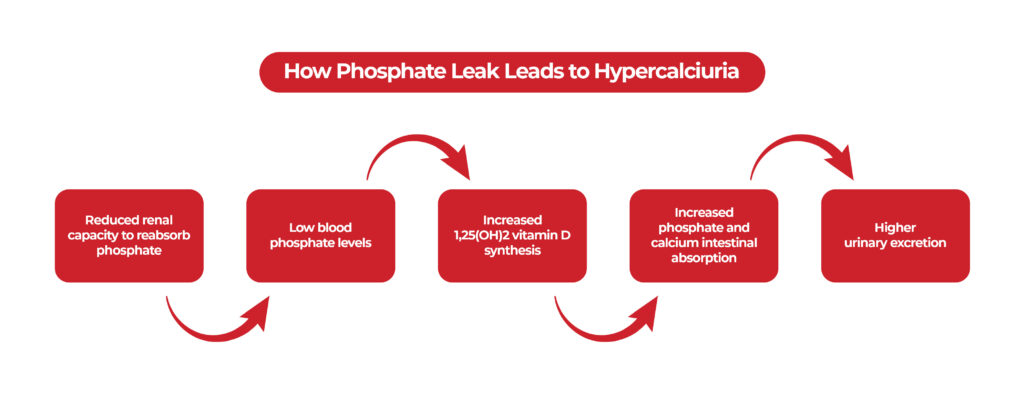
How Phosphate Leaks Lead to Kidney Stones
When there is a phosphate leak, the body’s natural balance between calcium and phosphate is disrupted. Phosphate levels in the blood drop, which in turn increases the levels of vitamin D, particularly calcitriol, the active form of vitamin D. This is where the issue begins: as vitamin D levels rise, the body starts to absorb more calcium, and this calcium is excreted into the urine.
Now, with high levels of calcium and phosphate in the urine, there is a higher chance for these two minerals to bind together. When this happens, they form calcium phosphate crystals, which can grow into calcium phosphate kidney stones.
The formation of these stones is influenced by several factors:
-
Urine pH: Calcium phosphate stones form best in alkaline urine (pH above 7).
-
Time: There needs to be sufficient time for the calcium and phosphate molecules to bind together.
The result is painful, often debilitating kidney stones, which can block the urinary tract and cause intense pain, commonly known as renal colic.
Dietary Deficiencies and Their Role in Phosphate Leaks
The body’s ability to maintain the balance between calcium and phosphate is highly dependent on dietary intake. If your diet lacks the necessary nutrients, such as calcium and phosphate, the body will struggle to maintain this balance. In particular, deficiencies in calcium or vitamin D can trigger a series of problems that contribute to kidney stone formation.
When you have a phosphate leak, the body attempts to compensate by increasing the levels of vitamin D. However, if your calcium intake is inadequate, your body will begin pulling calcium from your bones, which exacerbates the problem. This not only leads to weaker bones but also increases the likelihood of kidney stones, as the imbalance in calcium and phosphate continues.
🛒 Check Price & Purchase Stone Relief Pass AM/PM Bundle on Amazon
The Importance of Proper Calcium and Phosphate Intake
To prevent a phosphate leak and the formation of kidney stones, it’s crucial to maintain a proper balance of calcium and phosphate in your diet. Here’s how you can support this balance:
-
Calcium: Aim for at least 1200 milligrams of calcium per day. However, it’s important to focus on the sourceof calcium. Animal-based sources of calcium, such as dairy products (milk, cheese, yogurt), eggshells, and bone broth, are far more bioavailable and absorbable than plant-based sources. This is critical for kidney stone prevention, as plant-based calcium often does not bind as efficiently in the body, increasing the risk of urinary calcium and stones.
-
Phosphate: Phosphate is abundant in animal foods, particularly in meats, organ meats, and fish. Unlike plant-based phosphate, which is less absorbable, animal-based phosphate ensures better utilization by the body. If you’re following a plant-based diet, you may need to consider supplementation or other strategies to ensure you're getting enough absorbable phosphate.
-
Vitamin D: Vitamin D is essential for the absorption of both calcium and phosphate. Sunlight is the best natural source of vitamin D, but you can also get it from fish and egg yolks. If you live in a region with limited sunlight, especially during the winter months, consider vitamin D supplementation, but be cautious about over-supplementing, as excessive vitamin D can lead to problems with calcium absorption.
The Dangers of a Vegan or Vegetarian Diet for Kidney Stones
A vegan or vegetarian diet can be problematic for people prone to calcium phosphate kidney stones. While plant-based diets offer many benefits, they often lack sufficient calcium and phosphate and can foster an alkaline urine environment, which increases the risk of calcium phosphate stone formation.
If you follow a plant-based diet, it’s essential to be mindful of your nutrient intake, particularly regarding calcium and phosphate. Without sufficient animal-based foods, you may not be providing your body with the essential building blocks needed to maintain the calcium/phosphate balance in your kidneys.
🛒 Check Price & Purchase Stone Relief Pass AM/PM Bundle on Amazon
How to Correct a Phosphate Leak and Prevent Stones
To fix a phosphate leak and prevent calcium phosphate stones, consider making the following changes:
-
Optimize Calcium Intake: Ensure you are getting enough calcium daily from high-quality animal-based sources. This will help your body regulate calcium levels and prevent excess phosphate in the urine.
-
Maintain a Balanced Diet: Focus on a diet rich in animal-based sources of calcium and phosphate. Avoid relying on plant-based sources, which may not be as bioavailable.
-
Address Vitamin D Deficiencies: Ensure adequate vitamin D intake, either from sunlight, diet, or supplements. Vitamin D plays a crucial role in maintaining the calcium/phosphate balance and preventing kidney stones.
-
Monitor Your Health: If you suspect you have a phosphate leak, consult with your healthcare provider for a blood test to check phosphate levels. Address any underlying health conditions that may contribute to the imbalance, such as kidney disease or metabolic dysfunction.
Conclusion: Preventing Kidney Stones with Proper Nutrition
A phosphate leak disrupts the balance between calcium and phosphate in the body, leading to the formation of calcium phosphate kidney stones. To prevent these stones, it’s essential to maintain a proper balance of calcium, phosphate, and vitamin D through a balanced diet and proper supplementation. By focusing on animal-based sources of these nutrients, you can protect your kidneys and reduce your risk of stone formation.
If you’re prone to kidney stones, pay close attention to your diet and nutrient intake. Fixing a phosphate leak through dietary adjustments can help you avoid the pain and complications associated with calcium phosphate kidney stones.

